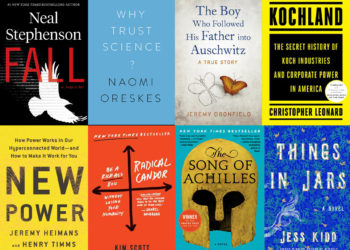As a parent, one can’t help but notice the differences between the world you grew up in and the world in which you’re raising your children. So many of these changes have been for the good — the ways we approach race or gender, for example, are so much more thoughtful than they were in my childhood. But one thing that is sadly gone from the landscape is the simultaneously shared cultural experience. By that, I mean that we live in a fragmented, streaming world. This has given us an enormously expanded set of choices for what we watch or listen to, or when we watch it or listen to it. There are no more television “schedules”, no real moments where everyone you know is experiencing the same piece of culture relatively simultaneously, whether it’s the last episode of MASH, the finale of Roots, or the fictional aftermath of a nuclear war. The water cooler or playground conversation is no longer unified, and is instead now fraught with fear of revealing spoilers because everyone is on their own schedule.
The way we learn about and experience world events and news is similarly fragmented these days, with so many different types of media, each vying to be the first with the story (accuracy being far less important than immediacy). We no longer experience the same objective reality, as many have realized that there is great profit and power to be gained from confirming the viewer’s biases, rather than confronting them with the truth (something I wrote about here). Sporting events are probably the only remaining vestige of simultaneously shared entertainment that we have left. I’ll leave it to each individual reader to determine the value one puts on sports, but surely we can agree that they provide a different type of experience than immersing oneself in a piece of fiction.

So I was pleasantly surprised to hear a schoolteacher complaining about his entire classroom being overtaken each Monday morning by The Mandalorian. For those living under a rock, this is the first live action Star Wars television series from Disney’s new streaming service. Rather than being released all at once for binge watching, one new episode is available per week, each Friday. There’s something of a perfect storm in that classroom — kids of an age where Star Wars is hugely important to them, yet too young to have cell phones and unfettered access to the internet. They don’t have the option of talking about the show with each other (or strangers) online, and so Monday morning is their first opportunity to share thoughts and ideas about the latest developments.
Regardless of what one thinks about Disney or the series itself, there’s something joyful in seeing such a shared, communal moment, a moment that is increasingly rare these days. We have certainly gained in quantity, and gained in convenience, but at the same time have sacrificed commonality and connection with those around us. We are reaching the end of a historical (if perhaps brief) era of broadcast media, where everyone in a particular region had access to the same, limited information and entertainment sources.
While the digital era has offered us the potential for expanded commonality and global connections, in practice it has resulted in filter bubbles and insulated communities of like-minded individuals, unwilling to confront anything that might offer a viewpoint with which they disagree (a recent example from the scholarly communication world here). No doubt this has contributed to the polarization of society and the levels of intolerance that seem on the rise. Perhaps there is value in inconvenience, particularly if it results in common ground and connection.
To bring this back around to the realm of publishing and business, there may be opportunity in not optimizing one’s product for immediacy and volume, but rather curating a type of experience that adds a different type of value beyond the content itself. The thriving market for vinyl records is one example, as the ritual involved in their play and the satisfaction they provide as a fetish object offers something that a fast and easy digital download cannot match.
And Disney is certainly aware that the slow, deliberate doling out of The Mandalorian has added to the attention the series has received, and that forcing viewers to slow down and fully absorb each episode before moving on to the next brings a different type of experience. In an age of abundance, it’s fascinating to see that scarcity still offers something of value.
Discussion
7 Thoughts on "A Rare Shared Cultural Experience and the Value of Inconvenience"
Wow, this is good! I was happy to tweet it. Who knows, maybe the tweets will be discussed together by several people, somehow. Disney is on to something. So are you. Thank you.
I think about this all the time — Like many of us, I grew up in the era where a TV show aired at one particular time and there was no easy option to watch “on your own time.” I had a whole box of VHS tapes with recordings of the X-Files so I could re-watch them at my leisure, because how else would I be able to watch them on demand? Regarding the relevance to publishing, we can look at things like preprints as evidence that some researchers value immediacy over quality, but many have the opposite interest. I suspect this conflict of interests will persist as we move toward a culture of openness in research.
The best shows *are* released episode by episode – eg. Game of Thrones.
The ‘shared cultural experience’ provides advertisers and entertainers with an opportunity to sell. They pull out all the stops or in Janet Jackson’s case a nipple flash that gained more column inches (to use an archaic metric) than the Superbowl game itself.
I agree “it has resulted in filter bubbles and insulated communities of like-minded individuals, unwilling to confront anything that might offer a viewpoint with which they disagree” and yet isn’t that the central tendency in urban life?
The idea of “shared cultural experience” as something that occurs in the isolation of our “little boxes” passively absorbing TV is something people used to rail against in the 60’s. It is a critique that goes from Marx’s ideas around the alienation of workers from their “species-essence” through to Situationalism and beyond.
The advent of social media provides a way to re-engage with each other. Tweet it!
Generally, I cannot be arsed with soaps and reality shows (The Apprentice, Eastenders, Love Island, X Factor et al)
I accept the necessity to follow football and other sports as a ‘shared culture’ with men in business.
Personally I prefer to go to the pub and see a live band every now and then. I hate having to share my pub with festive season drinkers or having to pay over the odds to see my favourite bands.
Bah Humbug
It’s the change from broadcast media, radio and tv, being transmitted everywhere at (almost) the same time and the internet where control is moving to the individual. IMO it’s part of the reason for divisions in society–with broadcast media rural areas had equal access with their urban and suburban counterparts (at least once electricity came to the area). Broadcast media was universal, but with limited choices; internet media still depends on broadband access and offers seemingly unlimited choice.
Broadcast television was not equally accessible to rural populations and still isn’t. In fact, subscription cable TV was original invented specifically to serve rural populations out of reach of TV broadcast signals. For example, when I lived in Lawrence, KS, only a 45 minute drive from Kansas City, I could get only one station over the air—at a low quality—even using an amplified antenna.
I love this post, David. Thank you for sharing. Although I certainly enjoy the convenience of streaming video today, I have very fond memories of TV nights with my family where we watched our regularly scheduled program together and then discussed after.
I enjoy David ‘s view too , which express what is perplexity of explotion and fragmentation of information . Yes, what can make people calm down and think about it, maybe David reminds us “ culture experience ” , Thanks !



